Working together makes a bigger impact
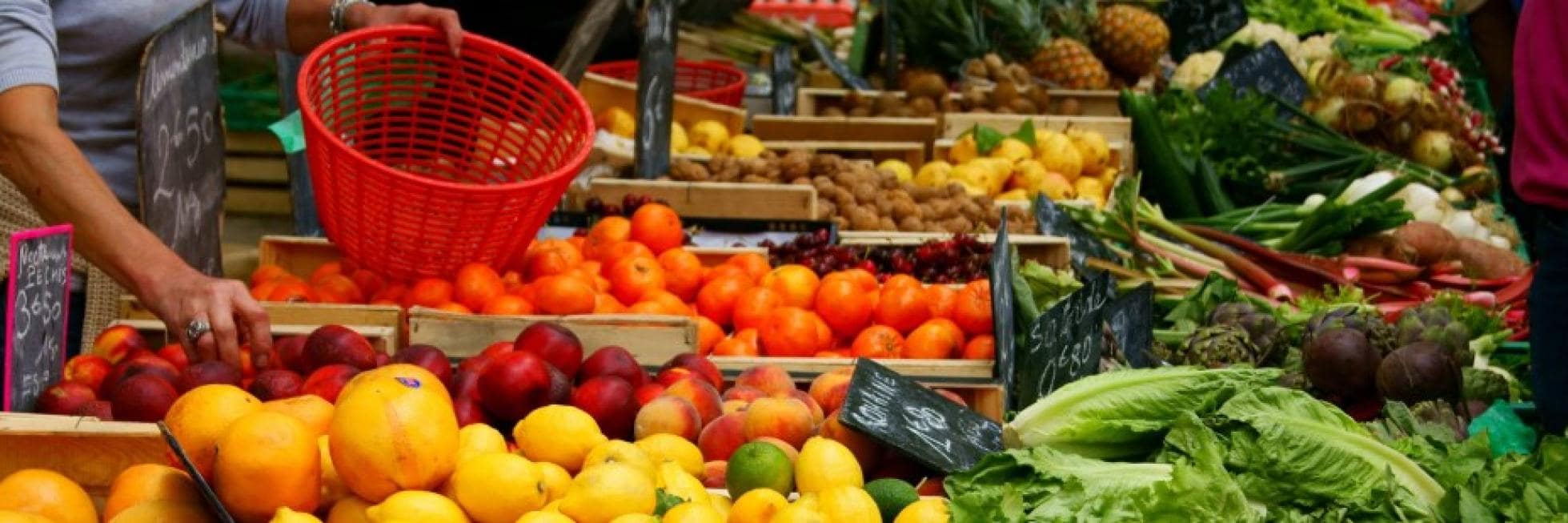
- Magazine
- Access to innovative health solutions
-
Covid-19
- Increased COVID-19 support for India
- Stronger Together in the fight against Covid-19
- Growing Enough during the Coronavirus Pandemic
- LIFE Stronger than lockdown
- Lessons for malaria elimination from covid-19
- The IT Army: catapulting digital change
- Safety at Vapi during Covid19
- Communications during covid-19
- Smallholder farmers and food security
- Digitalization
- Doubling farmers income
- Make in India
- People & Blogs
- Societal Engagement
- Sustainable agriculture
When it comes to food, the choices we make are largely governed by what we believe is safe for our families to consume, appealing to the eye and definitely attractive to the palate. But, a lot of the factors that influence our choices depend on decisions that made on the fields. Pankaj Sharma, Head of Food Chain India at Bayer, talks about how we work together with different stakeholders along the value chain through our Food Chain Partnership model to serve the changing needs of both farmers and consumers.
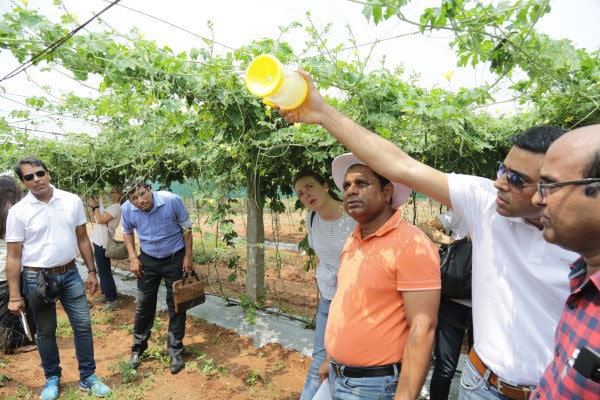
It’s very clear that consumers today want safe and healthy food at an affordable price. Some are conscientious about the environmental impact and want to know where the food comes from, how it is grown and what kind of crop protection products are used. These prerequisites are often translated, on behalf of consumers, to the producer farmers by organized retail players, traders (exporters/importers) & food processing companies. There is also an increasing demand for certifications from producer farmers in order to access local or global markets. That’s where our Food Chain Partnership model comes in - we act as a facilitator to bring different stakeholders together across the food value chain to achieve one common goal: sustainable production of high quality, affordable food while implementing good agriculture practices.
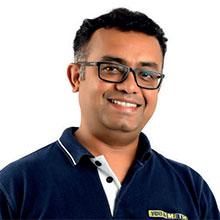
Let’s take an example of grape farmers from Nashik who want to export their produce to the European countries. They need to meet certain export compliance requirements specific for this region along with the corresponding certification. For this, they adhere to good agriculture practices and send their pre-harvest produce samples to laboratories to verify that chemical residues are well below the Maximum Residue Limits (MRLs). Each country has a different acceptable MRL for imports and only the produce that clears these tests can be exported. Similarly for other crops, some regions have restrictions on the use of certain molecules in crop protection. For example, the tricycazole molecule in superfine rice is not permitted in the European region. Thus, farmers need to use molecules that protect the crops from pest damage and at the same time are compliant with export requirement of the targeted market.
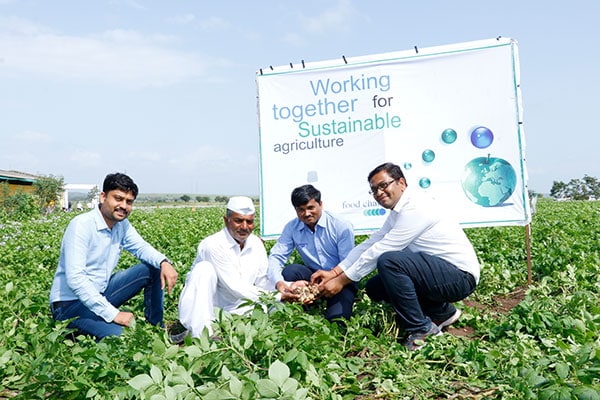
Growers, especially smallholder farmers, may not have access to all this information. We work closely with them to promote good agricultural practices right from seed to harvest. Together with the farmers, we design a complete crop calendar that covers usage of high quality seeds and services, customized and compliant crop protection, irrigation, advisory on optimal use of products and applications, integrated pest management, residue management, traceability records and post-harvest management. Every Food Chain Partnership project follows our global ‘5P’ process: production, plant protection, program monitoring, passport and post-harvest management.
In today’s global market place, where food is produced in one part of the world and consumed by someone sitting at the other end, it needs to be complimented with certain assurances. For example, when a farmer located in Maharashtra wanted to sell his/her produce to consumers in Europe, it needs to be accompanied by an assurance that the food traversing countries or even continents is of high quality and meets the necessary standards. This is done with the help of accreditation to certification programs like GlobalG.A.P. Currently, close to 10,000 farmers in India are GLOBALG.A.P. certified in the fruit and vegetable sectors.
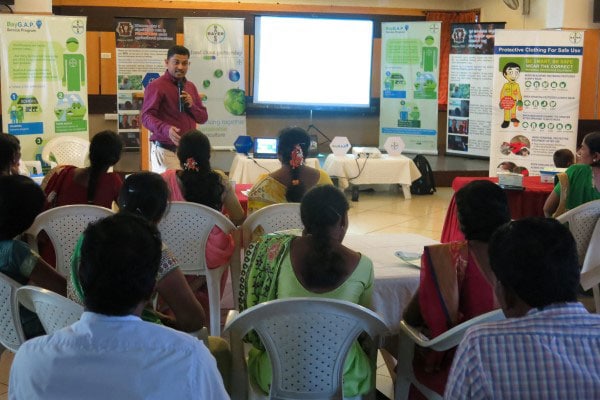
To meet this increasing need for certification, we support smallholder farmers through our BayG.A.P service program. Here, we provide training on implementing sustainable agricultural practices that will help them achieve localg.a.p. and finally GlobalG.A.P. certifications. Our BayG.A.P. program takes into account not only the quality and quantity of produce obtained from a unit area but also covers traceability and documentation, integrated crop solutions, food safety, and more. As of today, 752 farmers of our 14 partners in India have been trained as part of BayG.A.P in 24 training programs.

What next?
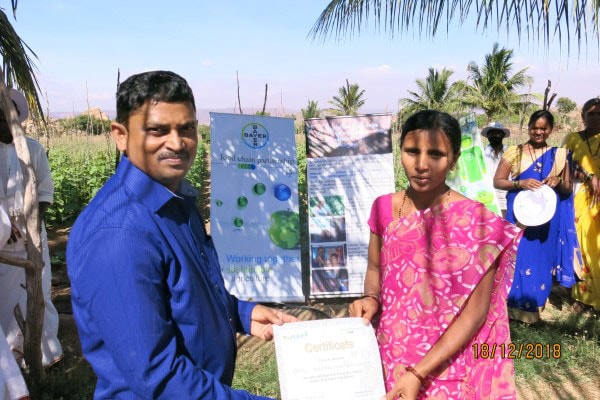
If you look at the trend now-a-days, firstly there is an increasing demand for food that is produced in sustainable manner – this basically refers to food produced through farming techniques and practices that help to conserve natural resources and have minimal impact on the environment without compromising the ability of future generations to do the same. Secondly, with increasing urbanization, changing consumer expectations, growing middle class and higher disposable income, there is a growth in organized retail propelled by big retailers and global traders who insist on a consistent supply of high quality food from across regions. Lastly, the food processing and export industry are two sectors that the Indian government is currently focusing on in order to boost the economy even further. According to me, these three major drivers call for an environment where only collaborations with all stakeholders involved across food value chain can create a big impact to fulfill ever increasing & evolving demand for quality food.
Collaboration brings trust between different stakeholders & ensures working together while benefiting & adding value to everyone. Today, we work with around 75 Food Chain Partners like Reliance Fresh, Metro, Greenyard, Sayahadri, IndyGlobal, LT Foods and Pepsico in the field of retail, exports and processing benefitting around 90,000 farmers in 16 different crops within India. Globally, we have more than 550 partnerships across 44 countries, covering a wide range of crops. This model of Food Chain Partnerships closes the loop within the value chain with consumers getting better quality, intermediaries getting consistent supplies supported with traceability, certification and farmers getting higher productivity with linkage to domestic & international markets. At the end of the day, when we work together, it brings added value to all the stakeholders involved – and that’s the beauty of our projects!






